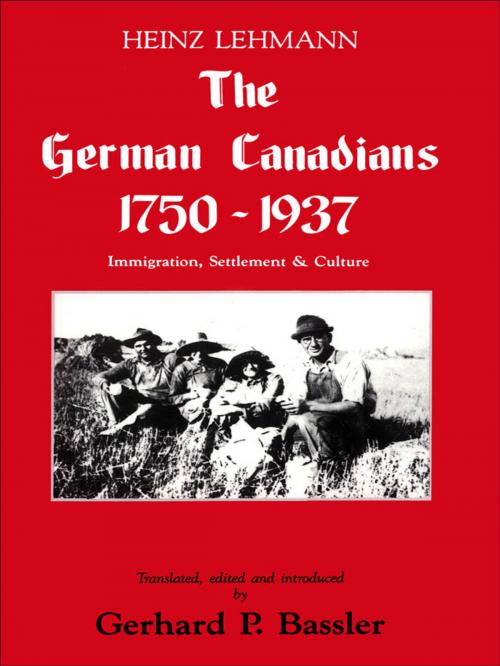The German Canadians 1750-1937
Immigration, Settlement & Culture
Nonfiction, History, Americas, Canada| Author: | Heinz Lehmann | ISBN: | 9781550813081 |
| Publisher: | Breakwater Books Ltd | Publication: | January 1, 1986 |
| Imprint: | Breakwater Books Ltd | Language: | English |
| Author: | Heinz Lehmann |
| ISBN: | 9781550813081 |
| Publisher: | Breakwater Books Ltd |
| Publication: | January 1, 1986 |
| Imprint: | Breakwater Books Ltd |
| Language: | English |
In tracing the pioneering role that German-speaking settlers from all over Europe and America played in the opening up and development of large parts of eastern and western Canada, Lehmann shows German Canadians to be one of Canada's founding peoples. His work establishes the important role played by ethnic Germans in the cultural and economic growth of Canada. Lehmann's account brings out the problematic nature of German-Canadian identity, which is a product of the religious, national, regional and generational divisions characterizing the German-Canadian mosaic. The analysis of extensive interaction among German settlers of different backgrounds, however, refutes the assumption of German Canadians as a mere accumulation of separate ethnic groups sharing the accident of a common mother tongue. Lehmann highlights the fact that Germans from eastern Europe and from the United States, and Mennonites in particular, rather than Germans from Germany, have given German-Canadian culture its unique stamp. Today we owe much of our knowledge of the roots and origins, the composition, the evolution and the spatial distribution of the German-Canadian community to Lehmann. His comprehensive and thorough analysis is the sine qua non for any serious preoccupation with the subject.
In tracing the pioneering role that German-speaking settlers from all over Europe and America played in the opening up and development of large parts of eastern and western Canada, Lehmann shows German Canadians to be one of Canada's founding peoples. His work establishes the important role played by ethnic Germans in the cultural and economic growth of Canada. Lehmann's account brings out the problematic nature of German-Canadian identity, which is a product of the religious, national, regional and generational divisions characterizing the German-Canadian mosaic. The analysis of extensive interaction among German settlers of different backgrounds, however, refutes the assumption of German Canadians as a mere accumulation of separate ethnic groups sharing the accident of a common mother tongue. Lehmann highlights the fact that Germans from eastern Europe and from the United States, and Mennonites in particular, rather than Germans from Germany, have given German-Canadian culture its unique stamp. Today we owe much of our knowledge of the roots and origins, the composition, the evolution and the spatial distribution of the German-Canadian community to Lehmann. His comprehensive and thorough analysis is the sine qua non for any serious preoccupation with the subject.















